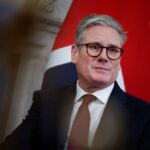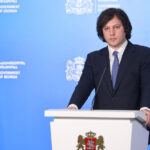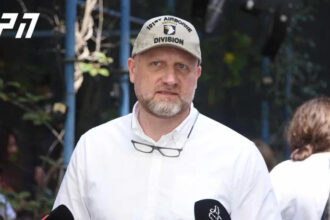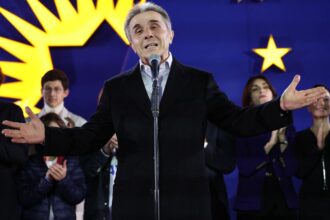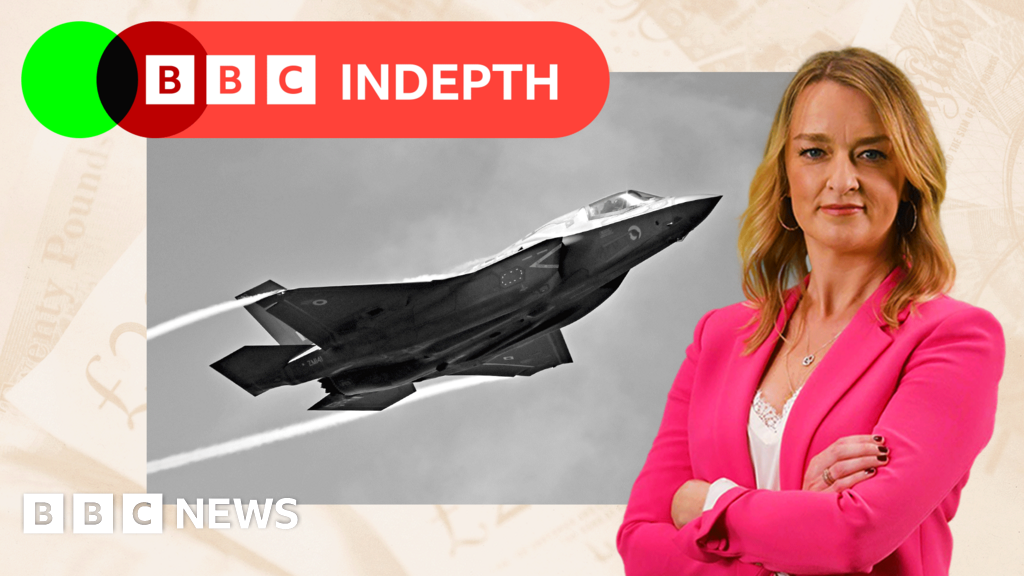You’re probably used hearing politicians tell you that we live in the most dangerous time for decades.
Who will pay for our protection, and why?
Donald Trump is less willing to pay for the defence of other countries than the current president.
One UK source told me that it didn’t make any sense for Europe’s defense interests to be dependent upon a few thousand Pennsylvania votes.
This question is now at the top of everyone’s mind after Trump’s return.
The UK government plans to eventually hit the Conservatives’ target of spending 2.5% on defence. This was last achieved in 2010.
There’s also a review of defence spending and a review of all Whitehall expenditure.
Next spring, they’re expected one after another.
John Healey was awarded an extra PS3bn as part of the Budget. This is a substantial amount of money, but not enough to transform defence spending.
It’s a one-year top-up, and there is no guarantee of funding on a long-term basis.
Former minister: “It is very difficult to order for years ahead. How long can we talk, when the need now is urgent?”
The government has refused to commit to achieving the 2.5% target by the end of 2029 and will not give a date for when they expect to achieve it. This has caused frustration in some quarters.
According to a senior source, “you either believe that this is the most dangerous period in decades and fund it properly or you don’t believe it at all.”
Ben Wallace, the former Defence Secretary, said that Labour had “cut our defence budget” by adding PS3bn in Ukraine funding.
He said he would be happy if Labour reached the 2.5% target. “But it has to be real money and a timetable.”
It is widely agreed that more resources are required.
John Healey has admitted that the military is “not ready to fight”. Wallace said that funding had been squeezed for many years, leaving the military “hollowed out”.
The UK’s support of Ukraine, which enjoys almost universal political support in the UK, has increased pressure.
According to the National Audit Office (NAO), the UK has committed almost PS8 billion to Ukraine in the form of air defence missiles and cruise missiles as well as tanks, ships, clothing and personal equipment.
Another former minister told that funding was “absolutely urgent” – urgent to help Ukraine, but most urgent where our forces were in danger. It’s not hypothetical – in the Red Sea, the Houthis are shooting at our ships.
Jonathan Powell, the new national security advisor for the government, wrote shortly before the elections that a new administration will need to strengthen the UK’s defense and security “within limits allowed by a struggling economic”.
Some insiders believe that the UK should spend more than 2.5% on security, despite the rising threats in the world.
A former minister told me that “by any measure, we are underspending. If you don’t purchase the insurance policy, you end up paying yourself and the costs of real conflicts will be enormous in comparison”.
A source in defence told me: “we will have to move on spending, or we can put fingers in our ears and pray we get through it. The Treasury must do the maths – to stop spending 5% of GDP in the near future, we need to spend now.”
How it is spent
It’s not only about how much money is spent on defence, but also how it is spent.
In recent history, there are many examples of Ministry of Defence (MoD) projects that have overrun and spent excessively. Some of these have been in eye-watering amounts.
One insider told us, “the worst we could do was spend more and spend badly… we need to increase the number but we must get a grip on procurement.”
Several sources remarked with pride and even surprise at the speed and effectiveness with which the MoD worked with Ukraine to deliver the right equipment quickly.
One person said that the MoD has “proven it can spend money well, but it needs to prove it can do it regularly”.
Another said that the British military must shed its culture of “only the finest and most perfect products can be purchased”.
The MoD believes it can improve the way that things are purchased and paid for by using new, more centralised methods. It has even hired a new national director of armaments to manage this.
As warfare methods evolve on the battlefield so do the military’s responses with equipment.
Former minister said: “Forget your big new fantasy regime – we can instead make what we already have more lethal.”
The government wants to clean up the mess that has developed in the defence procurement. It is clear that this is a much more difficult task than it appears.
Power era
Labour, as a party, is uncomfortable with Donald Trump’s reelection. However, in terms of defence, there is some sympathy for his attitude toward European defence funding.
One insider said: “Put on your incontinence trousers, don’t listen the rest of his political views, it’s not our business.”
Another source told me that “Trump set the challenge to Europe last time, and he was partly right,” pointing out the fact that after his tenure in office the number NATO countries who spent at least 2% on their GDP for defence went up.
Twenty-three countries now meet the 2% goal, up from six countries in 2020.
They said that rather than worrying about what Trump may do in office, “a prerequisite for Trump to seriously take European defence is for Europe to seriously take its own defense.”
It’s difficult to see how this does not mean that more countries on the African continent spend more of their own money.
“We must not fool ourselves. NATO deters Russia. We have to ensure that this happens,” said an official from the defence sector.
The role of America in our security is crucial. Sources in the government admit that Europe must play a strong financial role, given the conflict on its borders.
The UK wants to be seen as a leader in Nato and is taking steps to boost defense cooperation across the continent. Leaders recently signed a “landmark agreement” with Germany.
Donald Trump’s return as president of the United States has caused nerves to jangle across the Atlantic. What will it mean for Nato? What will it mean for US commitment to support Ukraine in terms diplomacy and hard cash?
There is an instinctive political unease with his behaviour, attitude towards the law, convention and the truth. Perhaps, as one source said, “it’s no longer a rule-of-law era. It’s now a power era”.
Even before the Trump victory, our politicians were facing serious questions about how to protect our interests.
Now that the unpredictable president will be returning, it is more important than ever to respond.
The UK and other European countries may need to show and pay more of their own power in order to get the Trump White House to join the party.
Sign up for Off Air with Laura K to receive Laura Kuenssberg’s expert insights and insider stories each week via email.
BBC InDepth, the new website and app, will feature the best analysis from our top journalists. We’ll be bringing you new perspectives that challenge assumptions and deep reporting on major issues to help make sense of an increasingly complex world. We’ll also be showcasing some of the most thought-provoking content on BBC Sounds and iPlayer. We’re starting out small but we have big plans. Please let us know what you think by clicking the button below.
Read More @ www.bbc.com





